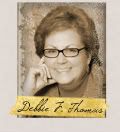And we want to wish our own Katy Popa a very Happy Birthday today!
It's August, and in my part of the world kids are buying school clothes and lunchboxes and Dixon Ticonderoga No. 2 pencils for the new school year. It may be the only time of year that some children genuinely look forward to going to school. And while they are generally interested in seeing friends and meeting their new teachers, there is also an element of excitement in the challenge to learn something new.
Learning new things is brain exercise. You may not look forward to the process, but you feel great having stretched. People learn in different ways, and that goes for writers, too. Sometimes, a great how-to book on writing makes learning a technique easy. At other times, it's the doing that leaves a lasting impression. Experience is often the best teacher, or at least, talking to someone who has gone through it. Some of us are off today, but those of us still here are sharing bits and pieces that we have found invaluable over the years.
Here are some of the lessons I hold valuable:
- write at the same time every day
- write what you love
- don't talk out your book before it's written
- read widely
- read about writers you admire & what they have to say about writing (Madeleine L'Engle is one)
- write a lovely note to a writer you admire (before he/she is gone)
- hold the pen loosely in case God has a different direction in mind for your writing
Lessons I hold valuable? I've done what we all have to do to make how and what we write our own. I've listened to a variety of teachers, emulated some, dismissed others, and cherry-picked from others. I've practiced, practiced, practiced and now have a subset of skills that I have put in my magic bag. If we were to peek in any writer's bag, the magic would be recognizable but different from what is in my bag.
My life is made up of 3x5 cards. I have bought thousands of
them in my life. I keep a basket of them on my desk, and carry spiral-bound
ones in my car. The notebooks I keep in my purse have pages about the same
size.
If I’m researching materials for a non-fiction, both the
bibliographic items as well as notes are on 3x5 cards. If I’m collecting notes
for character sketches for a novel, I write them on cards. Cool phrase that
pops into my mind? Interesting tidbit or description? 3x5 cards. I couldn’t
write – in fact, from high school on have never written –without them.















4 comments:
I read a book once, many years ago, that advocated the use of 3x5 index cards for the writing of novels. I searched my city for them. I still have them. Still never fully embraced them as useful, although I still admire those who do.
I carry a notebook/journal instead of cards. I think cards would be particularly helpful for research.
I tried once to fill out cards in a computer program. But when I got to the "composition" stage, I sit in the middle of the floor and "deal" the cards into logical stacks. I couldn't figure out how to do that and still be able to see the big picture, so to speak, on my computer.
I meant, when I get to the composition stage....
Post a Comment